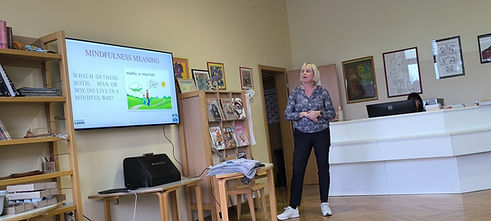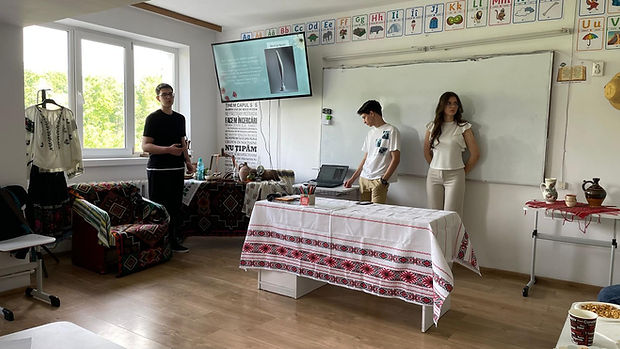A guideline
This is not just a guideline, it is a story. A story of searching for answers. We found some, but are still looking for more.

Inclusion
Knowledge opens the mind, understanding opens the heart, and acceptance brings us together.

From empathy to inclusion
Empathy is the first step toward true inclusion. The first step to empathy, is getting to know the persons, situations and challenges they face. When students learn to understand the experiences of classmates with a migration background, they begin to see the world through their eyes. This awareness helps them become allies instead of bystanders. Their support is essential in guiding and including these students in the school and local community. Together, empathy grows into shared responsibility and genuine inclusion.

Exploring the current situation
To prepare for the first international meeting, students had to gain more knowledge on the current situation in their country. Where do refugees come from? How many refugees are in each country or city? What challenges do they face? What challenges do we face in supporting or educating them?
Students made a presentation on this subject and showed it during the project meeting in Belgium.
Promoting peer learning
At school, students struggle to cooperate with FIS students. Communication is difficult and their situation, background and culture often hard to relate to. At the same time, FIS students point out that their main concern at school is or was the lack of friends and support of other students.
Yet, formal and informal peer learning can play an extremely important role both in the integration and learning process of FIS students. Therefore it is important to promote peer learning.
Teachers can design lesson plans that facilitate cooperation and include assignments that offer additional learning opportunities for students with a different mother tongue and background. They can also include empathy exercises to increase the understanding of the complex situation of refugee students.
In this project, we organized a live interview and Q&A session with a refugee student and a cooking workshop with refugee students. We designed lesson plans that focus on inclusion, cooperation and empathy (materials section), including a creative assignment to fight stereotypes and prejudices.


Looking at or own past and future
We often experience the feeling of a large distance between us and the refugees in our country. Their situation is so different from ours that it is hard to understand what they are going through. We feel as if this could never happen to us and/or never happened to us.
Starting from the situation in Belgium, we invited the students to think about their own past and future. Were or are they at risk to become a refugee or is this really unthinkable? During an interactive presentation we also touched on the reasons why you would flee, the fact that families are torn apart, the feelings of unsafety and other related issues. We visited the Red Star Line museum as an example of refugees in the past and included an assignment at the museum.
Involving the local community
To increase chances of success for FIS students, cooperation between the school and the local community is necessary. Organizations involved in the guidance of refugee students, host parents to unaccompagnied minors, volunteers who became buddies to refugees, etc can play an important role in the school carrier of these students. Schools should not only be aware of the possibilities for additional support in the local community, but also have an idea on what the partners involved do or could do.
During the project meeting several organizations, a host parent and a buddy gave a testimony and more insight in their work via a presentation, followed by round table conferences with the students.


We are all immigrants
To truly understand people with a migration background, it is important to gain deeper insight into cultures and intercultural differences. Comparing and studying the cultures of the participating countries is an exercise in empathy and intercultural awareness. From this understanding, we can better grasp the psychological impact of adapting to a new culture. Using digital tools, creative activities, and playful learning methods makes this process far more effective than simply reading or studying it in theory. By learning with and from each other, we build real connections across cultures.

Cultural awareness
To prepare for the second international meeting, students had to gain more knowledge on intercultural differences. We often focus mainly on our own customs, traditions, habits, and social norms, without always realizing how different these can be in other countries. Students are encouraged to explore their own culture by looking at it from a new perspective — seeing how it might appear ‘different’ to people from other backgrounds.
As part of a cultural fair, students created tables displaying objects, photos, and information representing their culture, and explained their meaning to visitors.
Interactive learning
In learning more on diversity, different cultures and inclusion of refugee students, different didactic approaches are important. Board games, a treasure hunt, creative workshops, games, creating posters and videos, storytelling, etc enhance students' engagement, cooperation and interaction. At the same time it provides reflection and helps overcome cultural issues and differences.
By organizing these activities on the subject of intercultural awareness, students involved in the project learn more on different cultures. At the same time, teachers can evaluate the effect of these approaches on the young learners and how the approach affects cooperation, interaction and engagement of all students, regardless of their background. This way it offers an opportunity to learn more on how to develop a more inclusive learning environment.


IT: a challenge and opportunity
The use of IT and digital apps in education is both a challenge and an opportunity for inclusion. On the one hand, not all students have equal access to technology or the skills to use it effectively. On the other hand, digital tools can make learning more accessible, interactive, and personalized, helping to include students with different backgrounds and learning needs. When used thoughtfully, technology can bridge gaps rather than widen them. Apps such as Padlet, Kahoot!, Socrative,
Nearpod, Educaplay, Edpuzzle, Quizlet, Mentineter, ClasDojo, PicCollage can foster the achievement of an inclusive learning environment.
Focus on mental health
To promote understanding and acceptance of FIS students it is important to take into account not only the cultural differences but also the emotions and issues a lot of these students are faced with. Struggling to adapt to a new culture challenges their mental health due to stress, isolation, homesickness, ... This comes on top of the often negative experiences that lead up to them leaving their home and country. Tools and resources to manage emotions and build resilience can play an important role in their guidance. This includes also the promotion of taking part in social activities and clearing the path towards looking for and accepting help in dealing with these issues.


A home away from home, different but together
Art forms such as theatre, poetry, music, and visual arts offer more than just a window into a culture, they create a bridge between people from different backgrounds. A school can support FIS not only through art and music, but also by working together with NGOs and encouraging critical and creative thinking. Such collaborations expose students to real-world issues and different perspectives, helping them develop empathy and global awareness.

Art as a bridge
Through artistic expression, we can feel and understand emotions that go beyond language and nationality. Sharing art allows us to recognize both our differences and our common humanity. In this way, creativity becomes a powerful tool for intercultural understanding and connection.
During the project meeting, students gave a presentation on art and music, visited exhibitions and participated in different workshops connected to this subject.
Critical and creative
By thinking critically and creatively, students learn to question assumptions, find solutions, and appreciate diversity — all essential skills for building an inclusive and understanding school community. Lectures by experts and presentations of examples of educational measures for FIS students followed by Q&A-sessions and debates as well as group assignments and workshops, encourage this critical and creative thinking. Including refugee students in these activities can at the same time be encouraged to participate more actively in the debate on prejudice and intolerance.


External partners
In each participating country, there are NGOs and initiatives from local authorities to support refugees. Learning about the work of these organizations can give students deeper insight into the challenges faced by FIS students, fostering greater understanding and tolerance. For schools, cooperating with such NGOs and with the local authority is equally valuable, as it can provide new perspectives and ideas for guiding and supporting these students more effectively. By sharing examples of cooperation between schools and external partners on refugee issues, through workshops and lectures by experts and through testimonies from refugees on their experiences, all participants gain more insight in the role and importance of these external partners in the guidance of migrant students.
Storytelling
While focusing on the role of external partners, the arts, and the importance of creative and critical thinking in supporting FIS students, we should not forget that the individual remains at the heart of it all. Listening to personal stories and giving those stories form through writing or art helps us see each student as a unique person. This personal approach fosters empathy, belonging, and deeper understanding within the school community.
Collecting and exchanging personal stories does not necessarily have to be an isolated activity. It can be included in all kinds of workshops. Often a common creative activity makes it easier for students to engage in personal conversations.
To improve the depth and extend of the conversations, students had the assignmnent to present a personal story together with a FIS student in writing or art. Establishing a collection of these stories and artworks opens up new opportunities for questions, discussions and reflection.


Break the barriers
Breaking the barriers, overcoming the challenges, promoting inclusion and acceptance of all. By engaging students and teachers, by focussing on academic knowledge, personal interactions and ways to improve it. In the final stage of the project, we keep the focus on all the above. And we add the final, maybe biggest challenge of all: language.

Language
Language is often the greatest barrier in the education of FIS (foreign or international) students. Without a strong command of the language of instruction, it becomes difficult to follow lessons, express ideas, or build connections with classmates. This can lead to feelings of isolation or frustration. Overcoming language barriers is therefore essential for both academic success and social inclusion.
Interactive tools, translation apps, and digital storytelling platforms make it easier for students to communicate, participate, and gain confidence. In this way, technology can transform a barrier into an opportunity for connection and inclusion.
